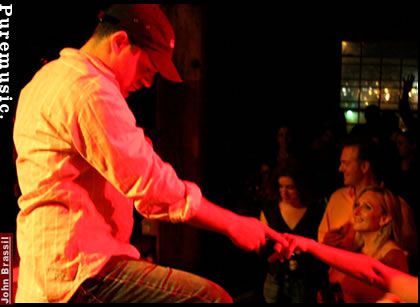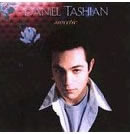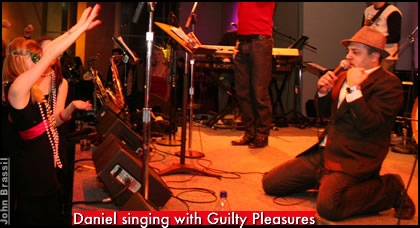
A Conversation with
Daniel Tashian
(continued)
DT: Okay, sure. Well, I think the thing that I sort of keep coming back to as being like a huge influence on me was really the influence of the Everly Brothers and of the Louvin Brothers on my parents, and how hearing those duets as kids really inspired them. And then when they got together they wanted to sing together. So really my first musical memories, as far back as I can remember, even like one or two years old, I remember songs like, "If I Could Only Win Your Love," and "Bye Bye Love," and "Cathy's Clown."
PM: Unbelievable songs.
DT: And "You're Running Wild" by the Louvin Brothers, and these kinds of things. Hearing those two voices together really gave me, as a child, kind of a taste for those nice tension notes that you hear. And you hear them in the Beatles. So that was my melodic thing, was really coming from those groups, I think the Louvin brothers and the Beatles and the Everly Brothers. And we try to get into a little bit of the "Walk Right Back" and those type of feels and "Cathy's Clown" even on "Hard Luck Tom." I'm always chasing that sound.
PM: Amazing.
DT: Let me see, what else was I going to say about my folks?
PM: Well, I mean, it's certainly a well-known bit of trivia that your dad Barry's group, The Remains, opened for the Beatles at Shea Stadium.
DT: Yeah, that's right. And then hearing that kind of music of course was a big influence. Well, it's sort of British--influenced by the British Invasion. [Here's a clip of "Ain't That Her" by Barry & The Remains from their 1966 album--you can find out more about them at theremains.com.] Really, when I listen to The Remains' record, I mean, it's hard to beat as far as the way it sounds, recording by Roy Haley and--
PM: Oh, I didn't know that.
DT: --in CBS Studios in New York. And they cut stuff down here with Billy Sherrill, who produced all those great duet records with George and Tammy--I don't really feel like I've even approached the kind of sonic level, what they were reaching for. And that's the thing, with each project we try to--we are in this for the long haul, and I would say with each record we're adding a few more notches on the belt.
PM: Well, as your personal story developed, having been influenced by the folks the way you were, and being such good musicians, not just musicians the way--a lot of musicians had musical parents, but you had very musical parents.
DT: Right, right.
[Here is a clip of Daniel's parents doing "I Know One," from Holly & Barry Tashian's 1994 album Straw Into Gold. More about them at tashianmusic.com.]
PM: Then you had a record deal early on in your teens, right?
DT: Uh-huh. And that's always been a little bit of a point of pride for me, because I remember reading Paul McCartney's book Many Years From Now, and he mentioned about having musical parents. And I thought, I'm sort of, for lack of a better word, I'm sort of like royalty. It's almost like the duke of--like Rufus Wainwright would be like the Prince of Wales, and I'm sort of like the duke of some county that nobody has heard of way down in the south somewhere--
PM: [laughs]
DT: --but I'm still royalty.
PM: You can't strip me of my title.
DT: I still am, and there's no way that I'm ever going to have like a real job, because it's gone too far, and I just got too much of a taste of life as an artist. I don't know what we were talking about before.
PM: [laughs] It's all really good. And I want to get to that record deal in your teens, because I don't know the story.
DT: I was a very ambitious young man. I got together an electric guitar. I got a Gretsch guitar and an AC-30 amplifier, both of which life has stripped from me, unfortunately.
PM: Really?
DT: I'd rather not talk about that.
PM: Indeed, yeah, the guitars we've lost...
DT: But I really wanted to make a mark and do something. And as much as I tried to take the country influence out of my music, and things were really popular, like all the A&R people were saying like, "You've got to hear this band, they're called Bark Market, and they're the next big thing." You haven't heard of them since, but this is what all the labels were wanting, was this kind of music. And even the Afghan Whigs, to a certain degree, were really popular, although they never really had a whole lot of melody.
PM: Right.
DT: And I was always sort of a melody guy. Even Black Sabbath has melody.
PM: Absolutely.
DT: As heavy as it is. And then the thing was, I was struggling against--the story of my record as a teenager was what I was really doing--I didn't know what I was doing, but I was making a country rock record. I mean, I had Bucky Baxter come and play steel all over the whole record, and lap steel, and pedal steel. It had really a strong country flavor to it. And the A&R guy from the label came in and said, "This is not cool. Take all that steel guitar off."
PM: Oh!
DT: "This sounds like Vince Gill." And really, I think the record would have been remembered more as a pioneering record if it had been left alone to be more of what it was, as opposed to trying to tailor it to the marketplace, which was very much about alternative rock.
PM: Right.
DT: That's my one regret about that project. But I felt very proud to be on a major label, and very proud to work with some of the really bright people in the music industry, like Bob Krasnow and T Bone Burnett, and these kind of legendary guys, and to rub shoulders with some of these guys. I felt very honored. And I carry a lot of great memories, and I learned a lot from that time.
PM: So what was T Bone like, especially to you, way back then?
DT: Well, he's got ADD to a pretty extensive degree, so he gets bored quite easily. But I remember at one point, it became a game. What could we do to this that would make T Bone interested in it?
PM: Wow.
DT: And we got very experimental one night, I remember. And Chris Feinstein was playing a bass drum with a pencil. Pat McCarthy was playing an Omnichord through an amp. Jay Joyce was playing a dobro. Matt Chamberlain was playing some kind of percussion. And I was playing this weird ukulele of Jackson Browne's that I found in the dumpster sort of behind his studio that he hadn't strung up or played probably since the '60s.
And T Bone came in and he said, "Now, that's what I'm talking about!" And that, actually, to this day, is my favorite track on the album. It's called "You." We really got experimental on that one.
T Bone is an artist, and he's been there, and he just doesn't have the patience to sit around and listen to the thing you've heard a million times. It's a strength and it's also a weakness, I think. But he's far more intelligent than I am. I think he was kind of letting me sort of take the reins and run the show. And then I felt so much pressure at one point I broke down and cried and said, "I feel like I can't do this by myself." And he said, "Well, I'm just so glad to know that you really care about this, and I'll really try to sort of shepherd you through this a little bit more. I've been letting you take the reins." So then, from that point on, he kind of held my hand a little bit more.
PM: Wow.
DT: But he's a really loving guy, and a very emotional guy, and a very heartfelt guy. And he also really feels music deeply. I mean, he was telling me about playing with the Rolling Thunder Review when Bob Dylan was bringing out these songs. He said that Dylan would sing "You're a Big Girl Now," and T Bone would just be in the band and he would just start crying at the songs, they were so beautiful. So he's a very emotional person, and he really feels music deeply. And that gives him--he's got the kind of sensitivity that you need to be a really great artist and great producer.
PM: Wow. And so how did life, musically and otherwise, start to unfold once the Sweetie project did whatever it did, or didn't do, upon--it got released, right?
DT: Well, it wasn't that it did or it didn't do anything; it was a total bomb. I mean, it was a complete disaster. And I spent so much money that basically I got blacklisted by the labels. I mean, nobody wanted to touch me because I just had a reputation for making records over and over again, and then the end result was nothing you could sell. I was pretty much, what's the Latin term--persona non grata. So it took a while to recover from that.

[Sweetie came out from Elektra in 1996. You can hear clips of the songs (and buy the CD) here.]
Once I figured out that I was really in it for the long haul, that was a big, big thing for me, because I realized what I was really into was writing songs and doing it. And I was planning to do it and be a musician and be involved in music for the rest of my life, so I might as well just knuckle down and figure out what to do. So then I started doing some more stuff. But I went through a period of pretty deep depression about--I had an identity crisis. I went back to art school, and did a million different jobs, and a ton of things--it's a long process.
PM: Yeah.

print (pdf) listen to clips puremusic home